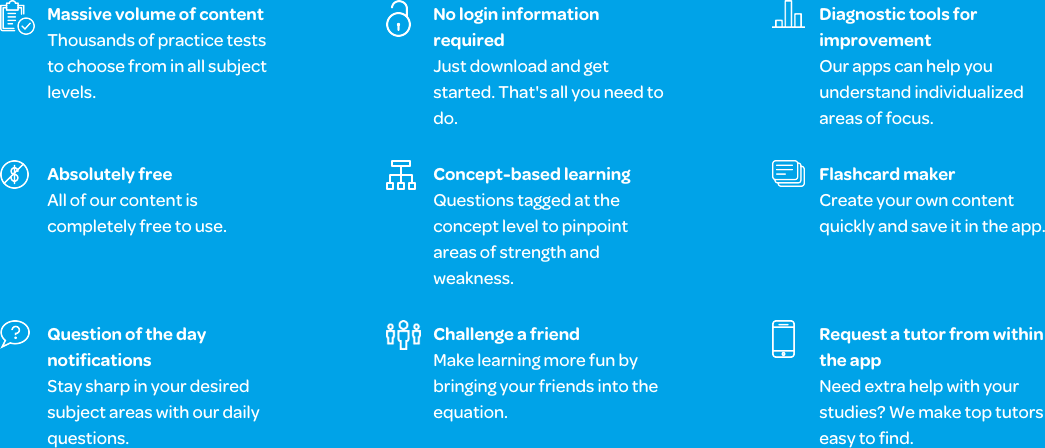The Varsity Tutors MCAT Mobile App
The free Varsity Tutors MCAT Prep app for iOS and Android devices gives on-the-go medical students an excellent, simple-to-use interface to study for the Medical College Admission Test (MCAT). Work on shoring up your problem-solving and critical thinking skills, as well as your knowledge in biology, psychology, chemistry, and physics. The questions you will encounter on the app are professionally written to give you the best possible preparation for this grueling, seven-hour test.
The MCAT is the standardized exam that you’ll take if you are applying to medical school. The skills that it tests are considered essential for future success in a career in the medical field, and your score is often considered an indicator of your ability to get through medical school. The MCAT is given on 22 dates every year. The test is given in the morning and afternoons on both weekdays and weekends, so no matter when your ideal test-taking time is, you will be able to find the right date for you.
The first portion of the MCAT tests you on biology, and includes questions about cell biology, molecular biology, and genetics. There are also questions on evolution and microbiology. The different systems in the body are extensively covered, and you will also need to know organic chemistry, biochemistry, and metabolism.
Next, in the physical science section, you will be asked about general chemistry, including acids and bases, atoms, the periodic table, equilibrium, and nuclear chemistry. You will also face questions in physics, including electricity and magnetism, fluids and gases, Newtonian mechanics and motion, and optics.
The third section on the MCAT is on social and behavioral sciences, where you will be asked about consciousness and thought, environment and sensation, group and individual behavior, psychological disorders and anomalies, and stress and emotion.
Finally, in the verbal reasoning section, you will need to apply your reasoning skills to tasks involving determining implications and causes of an event, making predictions, and understanding limitations. Your comprehension will be tested in comparing conflicting or supporting ideas, understanding an accurate paraphrase, understanding vocabulary in context, and using evidence to support a thesis. You will also be asked to evaluate and incorporate information provided with some questions, including critiquing hypothetical or theoretical conclusions.
To create an effective study plan, try one of the full-length, timed practice exams on the MCAT app to find out where your strengths and weaknesses lie. Comprehensive explanations are given for all of the questions, so not only do you find out the correct answers, but you’ll also learn how and why they are right. You can easily save your results over time to keep track of your progress. Once you know which areas you need to study, you can use the flashcards to test your knowledge anytime. You can even use the Flashcard Maker to create your own flashcards, which can include images, audio, and text for a personalized learning experience.
Having access to the Varsity Tutors MCAT Prep app's convenient, comprehensive study tools gives you the opportunity to fit in a little bit of review anytime, anywhere. Download the free app from iTunes or the Google Play Store today.
66 mobile apps to choose from for your tutoring needs.

Learn More
If you intend on pursuing a career in medicine, you will need to take the Medical College Admission Test. This is a computer-based standardized test administered by the American Association of Medical Colleges, and it is a prerequisite to being accepted into medical school. It tests your knowledge of biology and other sciences, while evaluating your critical-thinking and problem-solving skills.
In order to keep up with the changes and advancements in the medical community, the AAMC revised the MCAT exam in 2015. This was the first time that the exam had been changed since 1991, and has been revised in order to reflect the changes in scientific research. As part of these updates, it transitioned from a pencil-and-paper exam to a computerized one. The benefit of these changes means that you are given access to an updated curriculum that reflects the current landscape in science and medicine.
The MCAT exam is offered roughly 25 times each year at licensed testing centers. The test is divided into three sections: physical science, verbal reasoning, and biological science. The physical science portion tests you on topics like chemistry and physics, and you will be given 70 minutes to complete 52 questions. For the verbal reasoning, you have one hour to complete 40 multiple-choice questions regarding various written passages provided. After a 10-minute rest, you will be tested on your knowledge in life sciences, during which you are given a total of 70 minutes to complete 52 questions.
Because the MCAT is a comprehensive exam, you are required to have an extensive knowledge of a number of skills. You should be familiar with concepts related to physics, such as speed, acceleration, and velocity. Additionally, you should know about Sir Isaac Newton’s Laws, and balanced and unbalanced forces. You will also be required to know a variety of laws related to fluids, gas, and magnetism.
In order to receive a high mark on the MCAT, you should have a working knowledge of natural science. This includes understanding the Bohr Model, electromagnetic radiation, and the atomic spectrum. You should also know about atomic structures, electron configurations, and the momentum of photons.
As you move into biology, it is important that you have an understanding of prokaryotes and eukaryotes. You should understand the various structures within a bacterium, and what function each serves. Furthermore, you will need to explain the differences and similarities between prokaryotic and eukaryotic cells, identify the structures of chromosomes, and describe the function of the nucleolus in a eukaryotic cell.
It is important for a health practitioner to be knowledgeable of viruses and how they work. You should have an understanding of virology, and know that viruses are infectious agents that replicate in living organisms. Also know the structures of a virion that protect it as it exists outside of a host. You should also understand how viruses replicate, and have detailed knowledge about the replication of DNA and RNA viruses. As you dig deeper into viruses, you are expected to know about the “Retroviridae” family, which is home to the Human Immunodeficiency Virus, or HIV. Be aware that this virus is replicated through reverse transcription, and that it is fatal without antiretroviral medication.
As you prepare more for the MCAT, you will find yourself spending more time studying the human body. It is important that you have a good understanding of anatomy and the functions of parts of the body. This includes the anatomy of neurons and what purpose they serve, and how they relate to the nervous system. You should also be well acquainted with muscle tissues and how they function. This includes important proteins like myosin and actin, which both play an important role in muscle movement.
Another important part of medicine is understanding how the body stays healthy. Because of this, you are expected to know about the lymphatic system and understand how it works to keep the body free of toxic and unwanted material. You should be able to explain the body’s immune system, and know the difference between its two divisions: the innate and adaptive immune systems. Furthermore, you’ll want to be able to identify the differences between T cells and B cells, and how they act as your body’s weapon against foreign invaders.
Knowing the function of the nervous system is essential to comprehending the body’s complex system of organs. This includes the neural network, the gray and white matter in the brain, and the function of each brain structure. While studying for the MCAT, you should make sure you know about the endocrine system and how it regulates a variety of bodily functions through hormones. You should also know about the circulatory and hematologic systems, which regulate blood flow and blood content, the respiratory system, and the renal system.
There are a number of other important concepts that you should know in order to successfully pass the MCAT. One of these concepts is genetics, and how certain genes can increase the likeliness of disease in some individuals. You will also be expected to know about mutations, on an evolutionary level and on a practical level, and how the environment can influence mutation rates. Moreover, you need to have a working knowledge of sex determination and chromosomes.
Psychological and social concepts are important factors to consider when working in healthcare. Because of this, you are expected to have a working knowledge in psycho-social issues, from mental health problems to cultural factors that can influence one’s perception. You are also advised to develop an understanding of social inequality, and how poverty can have a negative effect on one’s health. Furthermore, you will not only look at how the environment can inform one’s thoughts and opinions, but you will also look at how things like trauma and stress can have a physical impact on the brain’s development and chemistry.
By understand all of these areas, you will be working to prepare yourself for the MCAT. While the test is comprehensive, you can make use of a variety of supplemental material to help prepare you for test day. MCAT preparation material is easy to find, and some of it is even available free of charge.




